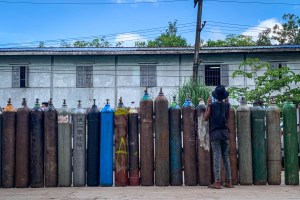At the peak of Myanmar’s deadly third wave of the coronavirus last month, 13-year-old Tun Lin Naing helped carry up to 10 corpses every day.
“First I was scared, but after I picked up more and more dead bodies, I was not afraid anymore. I feel numb,” he told VICE World News after a recent shift.
Videos by VICE

Tun Lin Naing’s participation in the fight against the virus has struck a chord in a country besieged by multiple crises at the same time. The military seized power in a coup more than six months ago, triggering nationwide strikes in which doctors walked out of hospitals, vaccine supplies were disrupted, and the health system teetered on the verge of collapse.
Myanmar’s junta arrested the head of the COVID-19 response, accusing her of having links to the demonstrations. By the time the delta variant emerged and set off a devastating wave of infections across several Asian countries, many people in Myanmar were on their own, sourcing oxygen canisters on social media.
In July, Britain’s envoy to the UN warned that half of Myanmar’s 54 million people could contract the disease. Less than 3 percent of the population is fully vaccinated, the second-lowest rate in Southeast Asia. Distrust with authorities runs so high that many have also refused or are wary of getting vaccinated.

This is the world young Tun Lin Naing enters when he rises in the morning, puts on full personal protective equipment, and gets into an ambulance to make his rounds with colleagues. There’s plenty to do. In past weeks, the daily death toll reached the hundreds, compared to a few dozen during previous surges.
Believed to be Myanmar’s youngest front-line medical worker, he is the oldest among four siblings. His impoverished parents have taken refuge in a Buddhist monastery. When schools closed down last year, leaving millions of kids with nothing to fill their days, he wandered over to a nearby charity organization called the Metta Thingaha Free Funeral service.

“He was curious about our work,” said U Minn Din, the 48-year-old chairman of the charity, which provides free transportation to cemeteries, hospitals and crematoriums.
Ambulance teams like the Free Funeral service became more essential as medical professionals went underground to run away from the junta. As COVID-19 cases peaked in the second week of July, a video surfaced on Facebook showing several dead bodies piled up at a crematorium in Yangon.
At first, Tun Lin Naing just washed coffins and assisted elderly members of the charity. But when the crisis worsened, he wanted to do more. The chairman received permission from his parents, and Tun Lin Naing joined the team. He is now under the care of the charity and sleeps at its offices. Attempts by VICE World News to reach his parents were not successful.
It wasn’t long before he was transporting suspected patients to isolation wards, and the dead in body bags to crematoriums.



But he was not used to seeing so much grief and heartache up close. He was also in full PPE during long hot days. In the beginning, the boy had trouble sleeping, said U Minn Din, but that changed after a month. “He was woken up just by the sound of someone’s footsteps. But he also adapted to things easily,” he said.
One of the obstacles was the weight of the bodies. “The challenge is that dead bodies are too heavy, so I have difficulty putting them in the body bags,” Tun Lin Naing told VICE World News.

The charity members, who number about 20, decided not to go home in order to protect their family members from the virus. After working and living with him for months, U Minn Din said Tun Lin Naing has “become my adopted son.”
In the second half of July, there were some days when dozens of bodies needed to be picked up. When a few other volunteers got sick, Tun Lin Naing, who had shown no symptoms, got busier. On occasion, when others were ill, he went to pick up bodies accompanied only by the driver of the ambulance. But they couldn’t lift the corpses alone, so family members of the victims had to help them.

Although the work is grueling, Tun Lin Naing says he doesn’t plan to quit any time soon.
“I want to keep doing this job until I get older,” he said.







